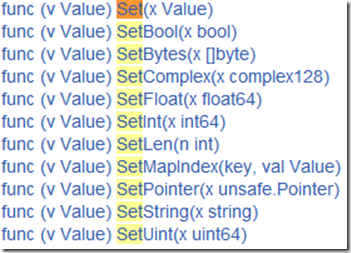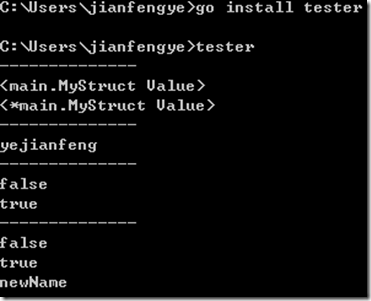这里的GO使用的版本是1.2
Go语言的基本语法的使用已经在前几篇陆陆续续学完了,下面可能想写一些Go的标准库的使用了。
先是reflect库。
reflect库的godoc在http://golang.org/pkg/reflect/
Type和Value
首先,reflect包有两个数据类型我们必须知道,一个是Type,一个是Value。
Type就是定义的类型的一个数据类型,Value是值的类型
具体的Type和Value里面包含的方法就要看文档了:
http://golang.org/pkg/reflect/
这里我写了个程序来理解Type和Value:
package main
import(
"fmt"
"reflect"
)
type MyStruct struct{
name string
}
func (this *MyStruct)GetName() string {
return this.name
}
func main() {
s := "this is string"
fmt.Println(reflect.TypeOf(s))
fmt.Println("-------------------")
fmt.Println(reflect.ValueOf(s))
var x float64 = 3.4
fmt.Println(reflect.ValueOf(x))
fmt.Println("-------------------")
a := new(MyStruct)
a.name = "yejianfeng"
typ := reflect.TypeOf(a)
fmt.Println(typ.NumMethod())
fmt.Println("-------------------")
b := reflect.ValueOf(a).MethodByName("GetName").Call([]reflect.Value{})
fmt.Println(b[0])
}
输出结果:
string ------------------- this is string <float64 value> ------------------- 1 ------------------- yejianfeng
补充,在Go version 1.5中会返回
string ------------------- this is string 3.4 ------------------- 1 ------------------- yejianfeng
这个程序看到几点:
1 TypeOf和ValueOf是获取Type和Value的方法
2 第三个b的定义实现了php中的string->method的方法,为什么返回的是reflect.Value[]数组呢?当然是因为Go的函数可以返回多个值的原因了。
Value的方法和属性
好了,我们看到Value的Type定义了这么多Set方法:
下面看这么个例子:
package main
import(
"fmt"
"reflect"
)
type MyStruct struct{
name string
}
func (this *MyStruct)GetName() string {
return this.name
}
func main() {
fmt.Println("--------------")
var a MyStruct
b := new(MyStruct)
fmt.Println(reflect.ValueOf(a))
fmt.Println(reflect.ValueOf(b))
fmt.Println("--------------")
a.name = "yejianfeng"
b.name = "yejianfeng"
val := reflect.ValueOf(a).FieldByName("name")
//painc: val := reflect.ValueOf(b).FieldByName("name")
fmt.Println(val)
fmt.Println("--------------")
fmt.Println(reflect.ValueOf(a).FieldByName("name").CanSet())
fmt.Println(reflect.ValueOf(&(a.name)).Elem().CanSet())
fmt.Println("--------------")
var c string = "yejianfeng"
p := reflect.ValueOf(&c)
fmt.Println(p.CanSet()) //false
fmt.Println(p.Elem().CanSet()) //true
p.Elem().SetString("newName")
fmt.Println(c)
}
返回:
这段代码能有一些事情值得琢磨:
1 为什么a和b的ValueOf返回的是不一样的?
a是一个结构,b是一个指针。好吧,在Go中,指针的定义和C中是一样的。
2 reflect.ValueOf(a).FieldByName("name")
这是一个绕路的写法,其实和a.name是一样的意思,主要是要说明一下Value.FieldByName的用法
3 val := reflect.ValueOf(b).FieldByName("name") 是有error的,为什么?
b是一个指针,指针的ValueOf返回的是指针的Type,它是没有Field的,所以也就不能使用FieldByName
4 fmt.Println(reflect.ValueOf(a).FieldByName("name").CanSet())为什么是false?
看文档中的解释:
好吧,什么是addressable,and was not obtained by the use of unexported struct fields?
CanSet当Value是可寻址的时候,返回true,否则返回false
看到第二个c和p的例子,我们可以这么理解:
当前面的CanSet是一个指针的时候(p)它是不可寻址的,但是当是p.Elem()(实际上就是*p),它就是可以寻址的
这个确实有点绕。
总而言之,reflect包是开发过程中几乎必备的包之一。能合理和熟练使用它对开发有很大的帮助。
20160829 补充:
Go 1.5的reflect Type方法可以看下面这个例子:
package main
import (
"fmt"
"reflect"
)
type MyStruct struct {
name string
}
func (this *MyStruct) GetName() string {
return this.name
}
type IStruct interface {
GetName() string
}
func main() {
// TypeOf
s := "this is string"
fmt.Println(reflect.TypeOf(s)) // output: "string"
// object TypeOf
a := new(MyStruct)
a.name = "yejianfeng"
typ := reflect.TypeOf(a)
fmt.Println(typ) // output: "*main.MyStruct"
fmt.Println(typ.Elem()) // output: "main.MyStruct"
// reflect.Type Base struct
fmt.Println(typ.NumMethod()) // 1
fmt.Println(typ.Method(0)) // {GetName func(*main.MyStruct) string <func(*main.MyStruct) string Value> 0}
fmt.Println(typ.Name()) // ""
fmt.Println(typ.PkgPath()) // ""
fmt.Println(typ.Size()) // 8
fmt.Println(typ.String()) // *main.MyStruct
fmt.Println(typ.Elem().String()) // main.MyStruct
fmt.Println(typ.Elem().FieldByIndex([]int{0})) // {name main string 0 [0] false}
fmt.Println(typ.Elem().FieldByName("name")) // {name main string 0 [0] false} true
fmt.Println(typ.Kind() == reflect.Ptr) // true
fmt.Println(typ.Elem().Kind() == reflect.Struct) // true
fmt.Println(typ.Implements(reflect.TypeOf((*IStruct)(nil)).Elem())) // true
fmt.Println(reflect.TypeOf(12.12).Bits()) // 64, 因为是float64
cha := make(chan int)
fmt.Println(reflect.TypeOf(cha).ChanDir()) // chan
var fun func(x int, y ...float64) string
var fun2 func(x int, y float64) string
fmt.Println(reflect.TypeOf(fun).IsVariadic()) // true
fmt.Println(reflect.TypeOf(fun2).IsVariadic()) // false
fmt.Println(reflect.TypeOf(fun).In(0)) // int
fmt.Println(reflect.TypeOf(fun).In(1)) // []float64
fmt.Println(reflect.TypeOf(fun).NumIn()) // 2
fmt.Println(reflect.TypeOf(fun).NumOut()) // 1
fmt.Println(reflect.TypeOf(fun).Out(0)) // string
mp := make(map[string]int)
mp["test1"] = 1
fmt.Println(reflect.TypeOf(mp).Key()) //string
arr := [1]string{"test"}
fmt.Println(reflect.TypeOf(arr).Len()) // 1
fmt.Println(typ.Elem().NumField()) // 1
// MethodByName, Call
b := reflect.ValueOf(a).MethodByName("GetName").Call([]reflect.Value{})
fmt.Println(b[0]) // output: "yejianfeng"
}


